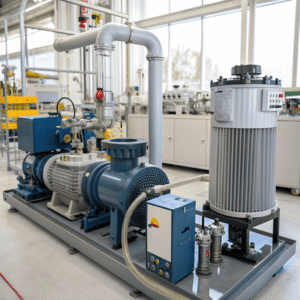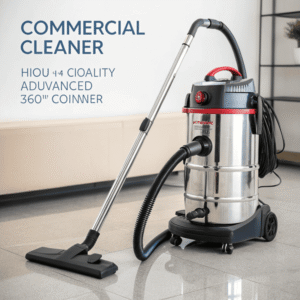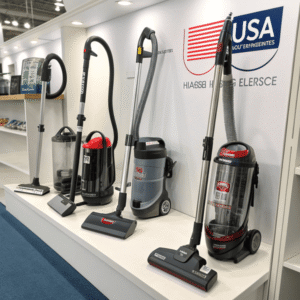Can I Use an Industrial Vacuum Cleaner in My House?
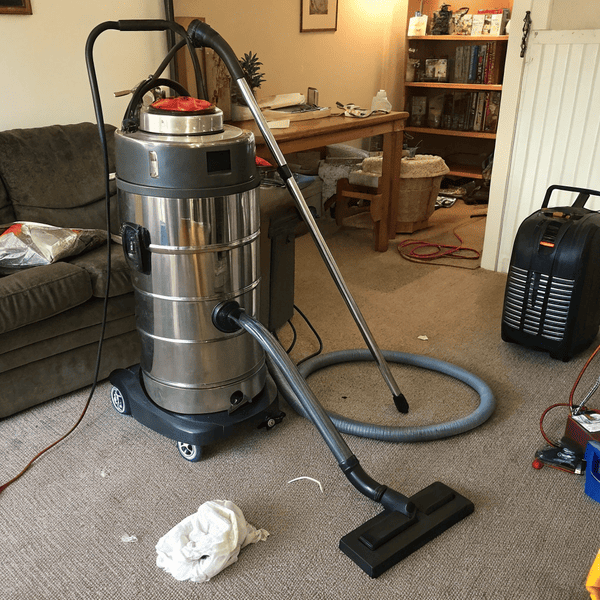
Dusty renovations, pet hair, or serious spills can overwhelm Dusty renovations, pet hair, or serious spills can overwhelm household vacuums. I’ve faced these messes and wondered if industrial power[^1] could save the day—or just make it harder.
[^1]: Explore how industrial power vacuums can tackle tough messes effectively, making your cleaning routine easier and more efficient.
. I’ve faced these messes and wondered if industrial power could save the day—or just make it harder.
You can use an industrial vacuum in your house, but it's often bulky, loud, and may be overkill for regular cleaning. Reserve it for big jobs like renovation debris, heavy dirt, or flood cleanup.
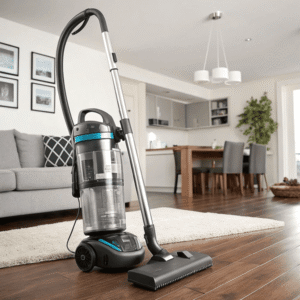
I once brought home a powerful shop vacuum after removing a wall. It worked brilliantly for rubble and dust clouds, but hauling it up the stairs and dealing with ear-splitting noise was not practical for everyday messes. Industrial vacuums have their place in the home—but only when the mess is just as large.
Can I use a commercial vacuum at home?
Whenever I borrowed cleaning gear from friends in the janitorial business, I thought about how a Whenever I borrowed cleaning gear[^1] from friends in the janitorial business, I thought about how a commercial vacuum would handle my busy household’s dirt and grime.
[^1]: Explore essential cleaning gear that can transform your home maintenance routine and keep your space spotless.
would handle my busy household’s dirt and grime.
You can use a commercial vacuum at home, especially for deep cleaning carpets or tackling large areas. They're more powerful than most home models but heavier and noisier.

I’ve used commercial models during spring cleaning and for post-party cleanup. They pulled dirt deep from my thick carpets and sped up the job—though plugging them in around corners and carrying them between floors was a workout on its own. For large homes, pet owners, or allergy sufferers, a commercial vacuum’s extra power definitely has benefits. Just know these machines might scratch delicate floors or overwhelm small living spaces, so balance your cleaning needs with the size and layout of your home.
Commercial Vacuum Pros and Cons
| Pros | Cons |
|---|---|
| Deep cleaning power | Heavier and bulkier |
| Built for frequent, tough use | Noisier than standard vacuums |
| Larger capacity (fewer empty cycles) | May not fit tight areas or soft floors |
| Heavy-duty filtration options | Usually more expensive |
Think about your lifestyle. If you host lots of guests or have a large household, the benefits may outweigh the tradeoffs.
What is the difference between a commercial vacuum and a home vacuum?
When I worked with both types at When I worked with both types at office jobs and in my own home[^1], the differences were easy to spot—well beyond just price or looks.
[^1]: This resource will highlight the perks of working from home, offering valuable perspectives on remote work.
and in my own home, the differences were easy to spot—well beyond just price or looks.
Commercial vacuums have stronger motors, larger dust bins, longer cords, and tougher construction than home models. Home vacuums are lighter, quieter, and made for everyday household messes.
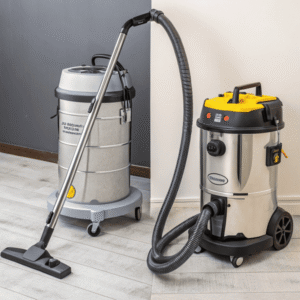
A home vacuum is easy to move and store, quiet enough for daily use, and often comes with multiple attachments for every nook and cranny. Commercial vacuums are designed to run for hours without overheating, handle more dirt and abuse from frequent use, and make fewer passes on dirty carpets. The trade-off is that they’re heavier and louder, which could get tiring in a small house. I always weigh the effort and storage needs against the power and durability I gain.
Features Comparison Table
| Feature | Home Vacuum | Commercial Vacuum |
|---|---|---|
| Weight | Light, compact | Heavy, large |
| Power | Moderate | High |
| Noise | Quieter | Louder |
| Durability | Enough for home use | Frequent, heavy use |
| Attachments | Many for home use | Fewer, more robust |
| Price | $75–$400 | $200–$700+ |
If your home needs everyday cleaning, a standard machine will likely do. But those with large spaces, pets, or heavy traffic might prefer a commercial upgrade.
What is the difference between industrial and regular vacuum cleaners?
From job sites to my own From job sites to my own renovation projects, I noticed industrial vacuums[^1] are in a class of their own—nothing like the ones I pick up at the mall.
[^1]: Explore this link to understand why industrial vacuums are superior for heavy-duty tasks and how they can enhance your projects.
I noticed industrial vacuums are in a class of their own—nothing like the ones I pick up at the mall.
Industrial vacuums are built to remove hazardous dust, liquids, and heavy debris in factories or construction. Regular (home) vacuums are for light, everyday cleaning and can’t safely handle industrial messes.
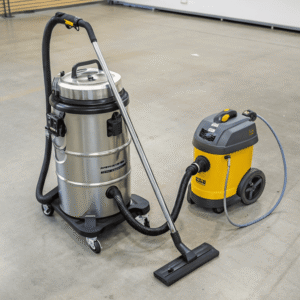
I rented an industrial machine for a post-floor-refinishing job. It handled sawdust, nails, and wet spills that would destroy any regular vacuum. These machines have specialized filters—sometimes even explosion-proof tech—huge tanks, and thick reinforced hoses. Regular vacuums keep homes comfortable and tidy but would quickly clog, overheat, or break if faced with commercial debris. For anything beyond basic dust, dirt, and hair, bringing an industrial vacuum into the home is only worth the hassle if you’re working on a major project.
Features Breakdown Table
| Feature | Regular (Home) Vacuum | Industrial Vacuum |
|---|---|---|
| Motor Power | 500-1200W | 1500W+ |
| Debris Capacity | Up to 3 liters | 10 liters and up |
| Filter Type | HEPA/Standard | HEPA, cyclone, anti-static |
| Use Case | Home cleaning | Construction, factories |
| Weight/Size | Lightweight, compact | Bulky, heavy-duty |
| Safety Features | Basic child lock | Explosion-proof, anti-static |
Industrial vacuums are not replacements for home vacuums but special tools for the toughest cleaning jobs. Use them only when you truly need industrial strength.
Conclusion
You can use industrial or commercial vacuums at home for big, messy jobs. For everyday cleaning, stick with lighter, quieter home models—they’re built for comfort and convenience.

